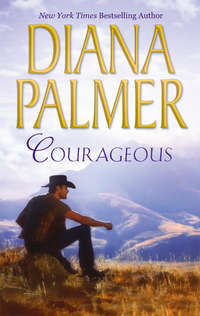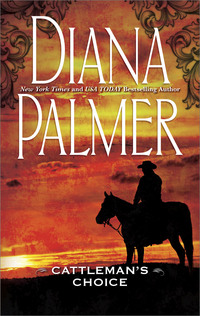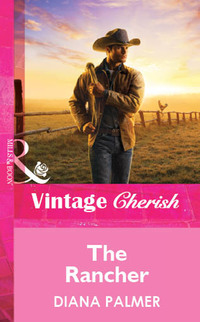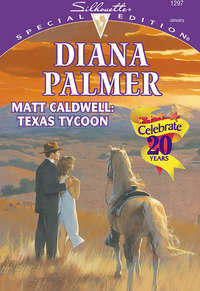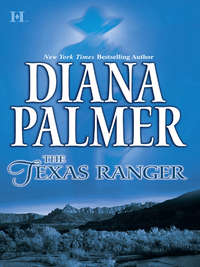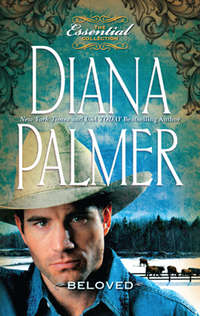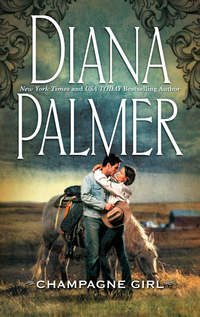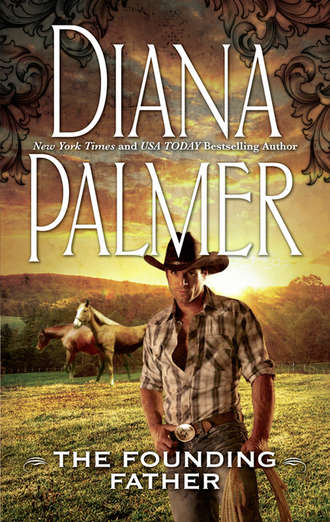
Полная версия
The Founding Father

New York Times bestselling author Diana Palmer revisits the story of the original Long, Tall Texans: the legendary man who built Jacobsville and the cowgirl who tamed him!
Big John Jacobs is eager to expand his growing Texas ranch, but he needs the help of the local railroad baron. Unable to sway his prospective partner with his business offer, John offers a proposal of another kind— a marriage of convenience to Camilla Colby, the tycoon’s debutante daughter!
Camilla knows John only married her for her father’s money, but she wants more than a bond in name only with her new husband. But will passion blaze when this fortune-seeking Long, Tall Texan brands his sweetly unassuming wife with his soul-searing kisses?
Originally published in 2003.
The Founding Father
Diana Palmer

www.millsandboon.co.uk
CONTENTS
Cover
Back Cover Text
Title Page
CHAPTER ONE
CHAPTER TWO
CHAPTER THREE
CHAPTER FOUR
CHAPTER FIVE
CHAPTER SIX
Extract
Copyright
CHAPTER ONE
IT TOOK A LOT TO MAKE Big John Jacobs nervous. He was tall, rawboned, with deep-set green eyes the color of bottle glass, and thick dark brown hair. His lean, rough face had scars left over from the War Between the States. He carried scars both inside and out. He was originally from Georgia, but he’d come to Texas just after the war. Now he lived in one of the wildest parts of southeast Texas on a ranch he’d inherited from his late uncle. He was building up the ranch frugally, heading cattle drives to Kansas and buying livestock with the proceeds. What he had was very little to show for fifteen years of hard work, but he was strong and had a good business head. He’d tripled his uncle’s land holdings and bought new bulls from back East to breed with his mangy longhorns. His mother would have been proud.
He noted the deep cut on his left hand, a scar from a knife fight with one of a band of Comanches who’d raided his property for horses. John and his hired help had fought them to a standstill and put them on the run. His ranch was isolated and he had good breeding stock. Over the years he’d had to fight roaming Comanche raiders and renegades from over the Mexican border, as well as carpetbaggers. If it hadn’t been for the military presence just after the war ended, courtesy of the Union Army, lawlessness would have been even worse.
John had more reason than most to hate Union officers. But in the part of Texas where his ranch was located, to the southeast of San Antonio, the peace had been kept during Reconstruction by a local commandant who was a gentleman. John had admired the Union officer, who’d caught and prosecuted a thief who stole two horses from the ranch. They were good horses, with excellent bloodlines, which John had purchased from a Kentucky thoroughbred farm. The officer, who rode a Kentucky thoroughbred of his own, understood the attachment a rancher felt to his blood stock. John had rarely been more grateful to another human being. Like John himself, the officer was fearless.
Fearless. John laughed at his own apprehension over what he was about to do. He didn’t mind risking his life to save his ranch. But this was no fight with guns or knives. It was a much more civilized sort of warfare. In order to win this battle, John was going to have to venture into a world he’d never seen close up. He wasn’t comfortable with high society folk. He hoped he wasn’t going to embarrass himself.
He removed his dress hat and ran a big hand through his sweaty brown hair. He’d had Juana cut it before he’d left the 3J Ranch. He hoped it was conservative enough to impress old man Terrance Colby. The railroad magnate was vacationing in Sutherland Springs, not far from the 3J. The popular resort boasted over one hundred separate springs in a small area. John had ridden out there to speak to Colby, without a single idea of how he was going to go about it. He had figured the details would work themselves out if he made the trip.
He was uneasy in company. He’d had to pawn his grandfather’s watch to buy the used suit and hat he was wearing. It was a gamble he was taking, a big one. Cattle were no good to anyone if they couldn’t be gotten to market. Driving cattle to the railheads in Kansas was becoming ever more dangerous. In some areas, fear of Texas tick fever had caused armed blockades of farmers to deter Texas cattle from entry. If he was going to get his cattle to market, there had to be a more direct route. He needed a railroad spur close by. Colby owned a railroad. He’d just announced his intentions of expanding it to connect with San Antonio. It would be no great burden to extend a line down through Wilson County to the Jacobs’ ranch. There were other ranchers in the area who also wanted the spur.
Old man Colby had a daughter, Camellia Ellen, who was unmarried and apparently unmarriageable. Local gossip said that the old man had no use for his unattractive daughter and would be happy to be rid of her. She got in the way of his mistresses. So Big John Jacobs had come a courting, to get himself a railroad…
It started raining just as he got to town. He cursed his foul luck, his green eyes blazing as he noted the mud his horse’s hooves was throwing up and splattering onto his boots and the hem of the one good pair of pants he owned. He’d be untidy, and he couldn’t afford to be. Terrance Colby was a New York aristocrat who, from what John had heard, was always impeccably dressed. He was staying at the best hotel the little resort of Sutherland Springs could boast, which was none too luxurious. Rumor was that Colby had come here on a hunting trip and was taking the waters while he was in the area.
John swung down out of the saddle half a block from the hotel Colby was staying at, hoping to have a chance to brush the mud off himself. Just as he got onto the boardwalk, a carriage drew up nearby. A young woman of no particular note climbed down out of it, caught the hem of her dress under her laced shoe, and fell face-first into a mud puddle.
Unforgivably, John laughed. He couldn’t help it. The woman’s companion gave him a glare, but the look he gave the woman was much more expressive.
“For God’s sake, woman, can’t you take two steps without tripping over your own garments?” the man asked in a high-pitched British accented voice. “Do get up. Now that we’ve dropped you off in town, I must go. I’ve an engagement for which you’ve already made me late. I’ll call on your father later. Driver, carry on!”
The driver gave the woman and Big John a speaking look, but he did as he was instructed. John took note of the stranger, and hoped to meet him again one day.
He moved to the woman’s side, and offered her an arm.
“No, no,” she protested, managing to get to her feet alone. “You’re much too nicely dressed to let me splatter you. Do go on, sir. I’m simply clumsy, there’s no cure to be had for it, I’m afraid.” She adjusted her oversized hat atop the dark bun of her hair and looked at him with miserable blue eyes in a pleasant but not very attractive face. She was slight and thin, and not the sort of woman to whom he’d ever been attracted.
“Your companion has no manners,” he remarked.
“Thank you for your concern.”
He tipped his hat. “It was no trouble. I wouldn’t have minded being splattered. As you can see, I’ve already sampled the local mud.”
She laughed and her animated face took on a fey quality, of which she was unaware. “Good day.”
“Good day.”
She moved away and he started into the barbershop to put himself to rights.
“John!” a man called from nearby. “Thought that was you,” a heavyset man with a badge panted as he came up to join him. It was Deputy Marshal James Graham, who often stopped by John’s ranch when he was in the area looking for fugitives.
They shook hands. “What are you doing in Sutherland Springs?” John asked him.
“I’m looking for a couple of renegades,” he said. “They were hiding in Indian Territory, but I heard from a cousin of one of them that they were headed this way, trying to outrun the army. You watch your back.”
“You watch yours,” he retorted, opening his jacket to display the Colt .45 he always wore in a holster on a gunbelt slung across his narrow hips.
The marshal chuckled. “I heard that. Noticed you were trying to help that poor young woman out of a fix.”
“Yes, poor little thing,” he commented. “Nothing to look at, and of little interest to a man. Two left feet into the bargain. But it was no trouble to be kind to her. Her companion gave her no more help than the rough edge of his tongue.”
“That was Sir Sydney Blythe, a hunting companion of the railroad magnate, Colby. They say the girl has a crush on him, but he has no use for her.”
“Hardly surprising. He might have ended in the mud puddle,” he added on a chuckle. “She’s not the sort to inspire passion.”
“You might be surprised. My wife is no looker, but can she cook! Looks wear out. Cooking lasts forever. You remember that. See you around.”
“You, too.” John went on into the barbershop unaware of a mud-covered female standing behind the corner, trying to deal with wiping some of the mud from her heavy skirt.
She glared at the barbershop with fierce blue eyes. So he was that sort of a man, was he, pitying the poor little scrawny hen with the clumsy feet. She’d thought he was different, but he was just the same as other men. None of them looked twice at a woman unless she had a beautiful face or body.
She walked past the barbershop toward her hotel, seething with fury. She hoped that she might one day have the chance to meet that gentleman again when she was properly dressed and in her own element. It would be a shock for him, she felt certain.
A short while later John walked toward the Sutherland Springs Hotel with a confidence he didn’t really feel. He was grateful for the marshal’s conversation, which helped calm him. He wondered if Colby’s daughter was also enamoured of the atrocious Sir Sydney, as well as that poor scrawny hen who’d been out riding with him? He wasn’t certain how he would have to go about wooing such a misfit, although he had it in mind.
At thirty-five, John was more learned than many of his contemporaries, having been brought up by an educated mother who taught him Latin while they worked in the fields. Since then, he’d been educated in other ways while trying to keep himself clothed and fed. His married sister, the only other survivor of his family, had tried to get him to come and work with her husband in North Carolina on their farm, but he hadn’t wanted to settle in the East. He was a man with a dream. And if a man could make himself a fortune with nothing more than hard work and self-denial, he was ready to be that man.
It seemed vaguely dishonest to take a bride for monetary reasons, and it cut to the quick to pretend an affection he didn’t feel to get a rich bride. If there was an honest way to do this, he was going to find it. His one certainty was that if he married a railroad tycoon’s daughter, he had a far better chance of getting a railroad to lay tracks to his ranch than if he simply asked for help. These days, nobody rushed to help a penniless rancher. Least of all a rich Northerner.
John walked into the hotel bristling with assumed self-confidence and the same faint arrogance he’d seen rich men use to get their way.
“My name is John Jacobs,” he told the clerk formally. “Mr. Colby is expecting me.”
That was a bald lie, but a bold one. If it worked, he could cut through a lot of time-wasting protocol.
“Uh, he is? I mean, of course, sir,” the young man faltered. “Mr. Colby is in the presidential suite. It’s on the second floor, at the end of the hall. You may go right up. Mr. Colby and his daughter are receiving this morning.”
Receiving. Go right up. John nodded, dazed. It was easier than he’d dreamed to see one of the country’s richest men!
He nodded politely at the clerk and turned to the staircase.
The suite was easy to find. He knocked on the door confidently, inwardly gritting his teeth to gear himself up for the meeting. He had no idea what he was going to give as an excuse for coming here. He didn’t know what Ellen Colby looked like. Could he perhaps say that he’d seen her from afar and had fallen madly in love with her at once? That would certainly ruin his chances with her father, who would be convinced that he only wanted Ellen’s money.
While he was thinking up excuses, a maid opened the door and stood back to let him inside. Belatedly he swept off his hat, hoping his forehead wasn’t sweating as profusely as it felt.
“Your name, sir?” the middle-aged woman asked politely.
“John Jacobs,” he told her. “I’m a local landowner,” he added.
She nodded. “Please wait here.”
She disappeared into another room behind a closed door. Seconds passed, while John looked around him uncomfortably, reminded by the opulence of the suite how far removed he was from the upper class.
The door opened. “Please go in, sir,” the maid said respectfully, and even smiled at him.
Elated, he went into the room and stared into a pair of the coldest pale blue eyes he’d ever seen, in a face that seemed unremarkable compared to the very expensive lacy white dress worn by its owner. She had a beautiful figure, regardless of her lack of beauty. Her hair was thick and a rich dark brown, swept up into a high bun that left a roll of it all around her head. She was very poised, very elegant and totally hostile. With a start, John recognized her. She was the mud puddle swimmer from the hotel entrance.
He must not laugh, he must not…! But a faint grin split his chiseled lips and his green eyes danced on her indignant features. Here was his excuse, so unexpected!
“I came to inquire about your health,” he said, his voice deep and lazy. “The weather is cold, and the mud puddle was very large….”
“I am…” She was blushing, now apparently flattered by his visit. “I am very well. Thank you!”
“What mud puddle?” came a crisp voice from the doorway. A man, shorter than John, with balding hair and dark blue eyes, dressed in an expensive suit, came into the room. “I’m Terrance Colby. Who are you?”
“John Jacobs,” he introduced himself. He wasn’t certain how to go on. “I own a ranch outside town…” he began.
“Oh, you’re here about quail hunting,” Colby said immediately. He smiled, to John’s astonishment, and went forward to shake hands. “But I’m afraid you’re a few minutes too late. I’ve already procured an invitation to the Four Aces Ranch to hunt antelope and quail. You know it, I expect?”
“Certainly I do, sir,” John replied. And he did. That ranch was the sort John wanted desperately to own one day, a huge property with purebred cattle and horses, known all over the country—in fact, all over the world! “I’m sure you’ll find the accommodations superior.”
The older man eyed him curiously. “Thank you for the offer.”
John nodded. “My pleasure, sir. But I had another purpose in coming. A passerby mentioned that the young lady here was staying at this hotel. She, uh, had a bad fall on her way inside. I assisted her. I only wanted to assure myself that she was uninjured. Her companion was less than helpful,” he added with honest irritation.
“Sir Sydney drove off and left me there,” the woman said angrily with flashing eyes.
Colby gave her an unsympathetic glance. “If you will be clumsy and throw yourself into mud puddles, Ellen, you can expect to be ignored by any normal man.”
Ellen! This unfortunate little hen was the very heiress John had come to town to woo, and he was having more good fortune than he’d dreamed! Lady Luck was tossing offerings into his path with every word he spoke.
He smiled at Ellen Colby with deliberate interest. “On the contrary, sir, I find her enchanting,” he murmured.
Colby looked at him as if he expected men with nets to storm the room.
Ellen gave him a harsh glare. She might have been flattered by the visit, but she knew a line when she heard one. Too many men had sought access to her father through her. Here was another, when she’d hoped he might like her for herself. But when had that ever happened? Disappointed, she drew herself up to her full height. “Please excuse me. I am in the middle of important work.” She lifted her chin and added deliberately, “My father’s dog is having her bath.”
She turned and stalked toward a door between rooms, while John threw back his head and laughed with genuine glee.
Colby had to chuckle, himself, at his daughter’s audacity. She never raised her voice, as a rule, and he’d long since come to think of her as a doormat. But this man pricked her temper and made her eyes flash.
“An interesting reaction,” he told John. “She is never rude, and I cannot remember a time when she raised her voice.”
John grinned. “A gentleman likes to think that he has made an impression, sir,” he said respectfully. “Your daughter is far more interesting with a temper than without one. To me, at least.”
“You have a ranch, you said?” Colby asked.
John nodded. “A small one, but growing. I have begun to cross breeds to good effect. I have a longhorn seed bull and a small herd of Hereford cattle. I hope to raise a better sort of beef to suit Eastern tastes and ship it to market in Chicago.”
The older man sized up his guest, from the worn, but still useful, shoes and suit and the well-worn gunbelt and pistol worn unobtrusively under the open jacket.
“You have a Southern accent,” Colby said.
John nodded again. “I am a Georgian, by birth.”
Colby actually winced.
John laughed without humor. “You know, then, what Sherman and his men did to my state.”
“Slavery is against everything I believe in,” Colby said. His face grew hard. “Sherman’s conduct was justified.”
John had to bite his tongue to keep back a sharp reply. He could feel the heat of the fire, hear his mother and sister screaming as they fell in the maelstrom of crackling flames….
“You owned slaves?” Colby persisted curtly.
John gritted his teeth. “Sir, my mother and sisters and I worked on a farm outside Atlanta,” he said, almost choking on memories despite the years between himself and the memory. “Only rich planters could afford slaves. My people were Irish immigrants. You might recall the signs placed at the front gates of estates in the North, which read, No Colored Or Irish Need Apply.”
Colby swallowed hard. He had, indeed, seen those signs.
John seemed to grow another inch. “To answer your question, had I been a rich planter, I would have hired my labor, not bought it, for I do not feel that one man of any color has the right to own another.” His green eyes flashed. “There were many other small landowners and sharecroppers like my family who paid the price for the greed and luxury of plantation owners. Sherman’s army did not discriminate between the two.”
“Excuse me,” Colby said at once. “One of my laundresses back home had been a slave. Her arms were livid with scars from a mistress who cut her when she burned a dress she was told to iron.”
“I have seen similar scars,” John replied, without adding that one of the co-owners of his ranch had such unsightly scars, as well as his wife and even their eldest daughter.
“Your mother and sisters live with you?” Colby asked.
John didn’t reply for a few seconds. “No, sir. Except for a married sister in North Carolina, my people are all dead.”
Colby nodded, his eyes narrow and assessing. “But, then, you have done well for yourself in Texas, have you not?” He smiled.
John forced himself to return the smile and forget the insults. “I will do better, sir,” he said with unshakeable confidence. “Far better.”
Colby chuckled. “You remind me of myself, when I was a young man. I left home to make my fortune, and had the good sense to look toward trains as the means.”
John twirled his hat in his big hands. He wanted to approach Colby about his spur, which would give him the opportunity to ship his cattle without having to take the risk of driving them north to railheads in Kansas. But that would be pushing his luck. Colby might feel that John was overstepping his place in society and being “uppity.” He couldn’t risk alienating Colby.
He shifted his weight. “I should go,” he said absently. “I had no intention of taking up so much of your time, sir. I wanted only to offer you the freedom of my ranch for hunting, and to inquire about the health of your daughter after her unfortunate accident.”
“Unfortunate accident.” Colby shook his head. “She is the clumsiest woman I have ever known,” he said coldly, “and I have found not one single gentleman who lasted more than a day as a suitor.”
“But she is charming,” John countered gallantly, his eyes dancing. “She has a sense of humor, the ability to laugh at herself, and despite her companion’s rudeness, she behaved with dignity.”
Colby was listening intently. “You find her… attractive?”
“Sir, she is the most attractive woman I have ever met,” John replied without choosing his words.
Colby laughed and shook his head. “You want something,” he mused. “But I’m damned if I don’t find you a breath of fresh air, sir. You have style and dash.”
John grinned at him. “Thank you, sir.”
“I may take you up on that invitation at a later date, young man. In the meantime, I have accepted the other offer. But you could do me a favor, if you’re inclined.”
“Anything within my power, sir,” John assured him.
“Since you find my daughter so alluring, I would like you to keep an eye on her during my absence.”
“Sir, there would not be adequate chaperones at my ranch,” John began quickly, seeing disaster ahead if the old man or his daughter got a glimpse of the true state of affairs at the Jacobs’ ranch.
“Oh, for heaven’s sake, man, I’m not proposing having her live with you in sin!” Colby burst out. “She will stay here at the hotel, and I have told her not to venture out of town. I meant only that I would like you to check on her from time to time, to make sure that she is safe. She will be on her own, except for the maid we have retained here.”
“I see.” John let out the breath he’d been holding. “In that case, I would be delighted. But what of her companion, Sir Sydney?” he added.
“Sir Sydney will be with me, to my cost,” Colby groaned. “The man is an utter pain, but he has a tract of land that I need very badly for a new roundhouse near Chicago,” he confessed. “So I must humor him, to some extent. I assure you, my daughter will not mourn his absence. She only went to drive with him at my request. She finds him repulsive.”
So did John, but he didn’t want to rock the boat.
“I’m glad you came, young man.” Colby offered his hand, and John shook it.
“So am I, sir,” he replied. “If you don’t mind, I would like to take my leave of your daughter.”
“Be my guest.”
“Thank you.”
John walked toward the open door that contained a maid, Miss Ellen Colby and a very mad wet dog of uncertain age and pedigree. It was a shaggy dog, black and white, with very long ears. It was barking pitifully and shaking soapy water everywhere.
“Oh, Miss Colby, this doggy don’t want no bath,” the maid wailed as she tried to right her cap.
“Never you mind, Lizzie, we’re going to bathe her or die in the attempt.” Ellen blew back a strand of loose hair, holding the dog down with both hands while the maid laved water on it with a cup.


